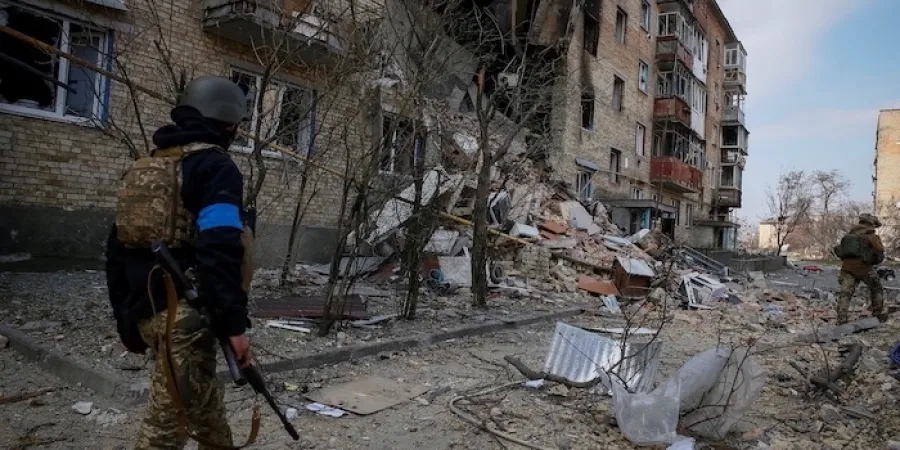Opinion | The ban on Israeli arms exports to Ukraine and Russia is likely to continue for some time
Attorney Shimon Aviran explains that even in times of peace, Russia and Ukraine are not on the list of approved countries, meaning that defense exporters are required to obtain a marketing license from the outset
IsraelDefense
| 29/03/2022
The blood-drenched war in Ukraine over the past few weeks has been characterized by uncertainty in every area of life, and is impacting the lives of the millions living in those regions in a heart-wrenching manner. At the same time, a different type of uncertainty has developed far away from there, here in Israel – in the Israeli Exports Controls Agency (DECA) branch of the Ministry of Defense, which has been forced to quickly adapt itself to the changing situation.
I am referring to the prevailing reality in countries and regions involved in the war, especially Russia, Ukraine (in its separatist provinces), and Belarus (the latter a country to which sales and exports of arms are not authorized even in normal times). All this against the backdrop of the fact that the DECA has not published guidelines on the subject since fighting began, for understandable reasons not to be elaborated upon here.
Due to the nature of things, Israeli exporters have received urgent inquiries recently – from both intermediary parties and users themselves – regarding the emergency purchase of defense equipment, transfer of defense know-how and provision of defense services for the purpose of defending civilian populations or for use by the fighting sides. But the lack of clear guidelines, along with the Israeli government’s policy of neutrality, have left defense exporters facing a major dilemma.
On the one hand, Israel has decided to maintain thundering neutrality and not join the international regimes imposing tremendous economic sanctions on Russia and the separatist provinces; but on the other hand, all empathy aside, they have also decided not to provide defense equipment assistance to Ukraine out of fear of Russia’s reaction – even defense equipment intended solely for the protection of civilian populations, such as helmets and defensive vests.
Russia and Ukraine are not on the list of “approved countries” even in times of peace, meaning that defense exporters are from the outset required to obtain marketing licenses for any marketing of supervised defense equipment to these countries.
But if in the past these licenses were issued for Russia and Ukraine under the strictest of conditions, it can be assumed that currently, any application to market defense equipment under the Defense Export Controls Act would be immediately dismissed – as a matter of policy. All the more so, there is no chance that export licenses would be issued for these countries.
But what about cases where marketing licenses were already obtained, negotiations took place, agreements were signed, and export licenses were issued (or are in the process of being issued)? Will the export license be revoked? Will the not-yet issued license be denied? As mentioned, the DECA prefers to not publish clear policies on the subject.

Shimon Aviran. Photo by Tomer Yacobson
It can nevertheless be assumed that any inquires to the DECA on the subject will receive the following response: New marketing licenses will not be issued for Russia and Ukraine (they are anyway not issued for Belarus); existing marketing licenses for these countries will be suspended or revoked; and new export licenses will not be issued, even in cases where a marketing license has already been legally obtained.
Existing export licenses already issued to an exporter, and any equipment, service and know-how that has not yet left Israel – will also be suspended or revoked. In other words, what has already left the country cannot be returned, but what has not yet left will not leave, at least not at this stage.
What’s clear is that Israeli defense exporters will from now on be required to diligently check each new purchase request for defense equipment, defense know-how or the provision of defense services for these countries or countries suspected of being “transition states” for these countries and regions, since the DECA will not issue marketing licenses (and certainly not export licenses).
All this, even before a discussion of the international sanctions imposed on Russia, Belarus, and the Ukrainian separatist regions, makes defense exports to there an impossibility from any perspective.
What’s more, because Israeli defense exporters are legally and economically tied to international entities, whether through ownership or partnerships with companies whose countries have joined the international sanctions, they must diligently check the international regimes and their applicability to Israeli defense exporters, lest any forbidden activity in the countries and regions upon which the sanctions were imposed lead to a situation in which Israeli defense exporters are negatively impacted.
Written by Attorney Shimon Aviran, Head of the Defense and Homeland Security Desk atTadmor Levy & Co. Aviran previously served as Senior Deputy Legal Advisor at the Israeli Ministry of Defense.
Attorney Shimon Aviran explains that even in times of peace, Russia and Ukraine are not on the list of approved countries, meaning that defense exporters are required to obtain a marketing license from the outset
The blood-drenched war in Ukraine over the past few weeks has been characterized by uncertainty in every area of life, and is impacting the lives of the millions living in those regions in a heart-wrenching manner. At the same time, a different type of uncertainty has developed far away from there, here in Israel – in the Israeli Exports Controls Agency (DECA) branch of the Ministry of Defense, which has been forced to quickly adapt itself to the changing situation.
I am referring to the prevailing reality in countries and regions involved in the war, especially Russia, Ukraine (in its separatist provinces), and Belarus (the latter a country to which sales and exports of arms are not authorized even in normal times). All this against the backdrop of the fact that the DECA has not published guidelines on the subject since fighting began, for understandable reasons not to be elaborated upon here.
Due to the nature of things, Israeli exporters have received urgent inquiries recently – from both intermediary parties and users themselves – regarding the emergency purchase of defense equipment, transfer of defense know-how and provision of defense services for the purpose of defending civilian populations or for use by the fighting sides. But the lack of clear guidelines, along with the Israeli government’s policy of neutrality, have left defense exporters facing a major dilemma.
On the one hand, Israel has decided to maintain thundering neutrality and not join the international regimes imposing tremendous economic sanctions on Russia and the separatist provinces; but on the other hand, all empathy aside, they have also decided not to provide defense equipment assistance to Ukraine out of fear of Russia’s reaction – even defense equipment intended solely for the protection of civilian populations, such as helmets and defensive vests.
Russia and Ukraine are not on the list of “approved countries” even in times of peace, meaning that defense exporters are from the outset required to obtain marketing licenses for any marketing of supervised defense equipment to these countries.
But if in the past these licenses were issued for Russia and Ukraine under the strictest of conditions, it can be assumed that currently, any application to market defense equipment under the Defense Export Controls Act would be immediately dismissed – as a matter of policy. All the more so, there is no chance that export licenses would be issued for these countries.
But what about cases where marketing licenses were already obtained, negotiations took place, agreements were signed, and export licenses were issued (or are in the process of being issued)? Will the export license be revoked? Will the not-yet issued license be denied? As mentioned, the DECA prefers to not publish clear policies on the subject.

Shimon Aviran. Photo by Tomer Yacobson
It can nevertheless be assumed that any inquires to the DECA on the subject will receive the following response: New marketing licenses will not be issued for Russia and Ukraine (they are anyway not issued for Belarus); existing marketing licenses for these countries will be suspended or revoked; and new export licenses will not be issued, even in cases where a marketing license has already been legally obtained.
Existing export licenses already issued to an exporter, and any equipment, service and know-how that has not yet left Israel – will also be suspended or revoked. In other words, what has already left the country cannot be returned, but what has not yet left will not leave, at least not at this stage.
What’s clear is that Israeli defense exporters will from now on be required to diligently check each new purchase request for defense equipment, defense know-how or the provision of defense services for these countries or countries suspected of being “transition states” for these countries and regions, since the DECA will not issue marketing licenses (and certainly not export licenses).
All this, even before a discussion of the international sanctions imposed on Russia, Belarus, and the Ukrainian separatist regions, makes defense exports to there an impossibility from any perspective.
What’s more, because Israeli defense exporters are legally and economically tied to international entities, whether through ownership or partnerships with companies whose countries have joined the international sanctions, they must diligently check the international regimes and their applicability to Israeli defense exporters, lest any forbidden activity in the countries and regions upon which the sanctions were imposed lead to a situation in which Israeli defense exporters are negatively impacted.
Written by Attorney Shimon Aviran, Head of the Defense and Homeland Security Desk atTadmor Levy & Co. Aviran previously served as Senior Deputy Legal Advisor at the Israeli Ministry of Defense.



